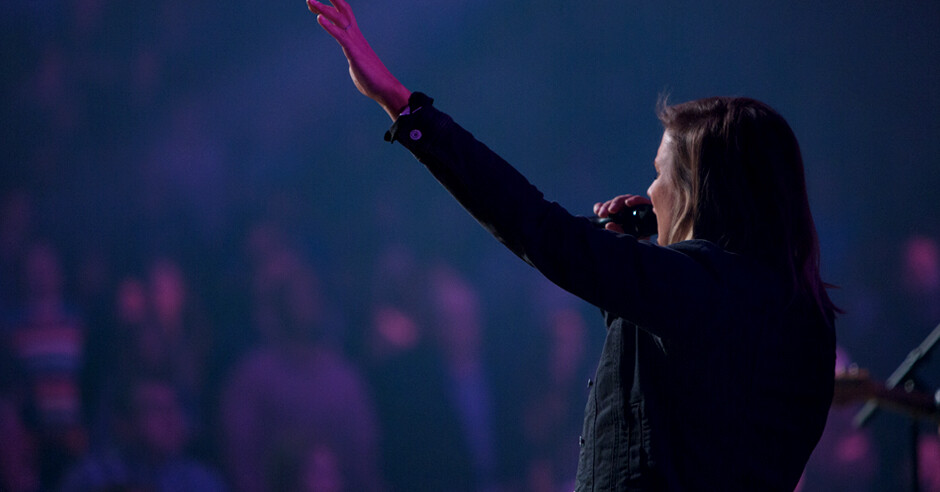
Have you ever been around a kid who has just begun the “WHY?” phase? You say something, and then the inevitable “Why?” follows. A lot of people find this frustrating. But, as a parent, I’ve come to truly embrace and love this phase in my children. It’s basic curiosity. Innocence at its finest. They are trying to learn. They're eager to acquire new information. And having an answer is helpful, but discovering the answer together is even better.
As a worship leader, I sometimes find myself asking "Why?" as well. Why do we worship God? Why is worship necessary? I read a blog once that said, “Worship is not about us. It’s about God. But, God doesn’t need our worship, we need Him.” That was so profound to me—we worship because we need Him.
So, I want to dive a little deeper into the question of “Why?” in our worship. Why do we gather together every weekend to sing together? Why does it matter?
1. Worship restores us.
God does not need our worship. He is God—He doesn't need anything from us. But we need to worship because it restores us to the One who created us in the first place. And, apart from Him, we have no hope. We have no resurrection. We have no purpose or eternal focus.
In the song, King Of My Heart, there are two separate moments in the song where we sing two very uplifting messages: “You are good” and “You’re never gonna let me down.” Sometimes, when I sing these phrases in church, I don't always feel like it’s true. But what I’ve discovered lately, in part by subtle promptings from God, is that the very act of singing these phrases in our songs over and over again restores my faith and reminds me what is true: He is good, and He will never let me down.
Time and time again, God has shown each and every one of us this truth. Take the last supper, for instance. Remember when Jesus was sitting at the table with all of His best friends? They were breaking bread together, and Jesus started washing their feet. All the signs of a killer party, right? And then, BAM. Jesus looks at them and says, “I am going to die.” Wait, what? Talk about a rug-ripped-out-from-underneath-you-moment. The Savior of the world, whom these men have given their lives to, is now saying He’s leaving. And not just leaving, but DYING!
We will be let down. We will have moments where the rug is ripped out from under us just like the disciples experienced. But what Jesus said after His death and resurrection was even more unbelievable. He said “Go.” Make disciples. Tell people what you’ve heard and seen. Worship. And then He urged, “And be sure of this: I am with you always, even to the end of the age” (Matthew 28: 20, NLT). The life, death, and resurrection of Jesus is what we sing about. And it’s restorative. Always.
2. Worship refocuses our minds.
There’s this beautiful passage of scripture where the writer, Paul, is telling us about an interaction he’s having with a newly planted church in the city of Galatia. I love this passage because it explains so well how worship refocuses our minds. Paul says, “As for me, may I never boast about anything but the cross of Jesus Christ. Because of that cross, my interest in this world has been crucified, and the world’s interest in me has also died.” He goes on, “What counts is whether we have been transformed into a new creation” (Galatians 6:14-16, NLT).
What Paul is essentially saying is that “IT’S NOT ABOUT ME!” How profound, right? But, we’re not wired to think like this. We’re wired to think selfishly. We are wired to think, “ME FIRST.” It’s central to our sinful nature. We are central to ourselves. But, what Paul is communicating to the people is that God is the one who should be central.
How does this concept translate to our weekly worship gathering? Let me tell you: The point is that we must leave behind ourselves as soon as we walk through those double doors—our pains, our fears, our anxieties about tomorrow, our complaints, our insecurities, our judgmental thoughts, our selfish ways of thinking. Instead, we should walk in open-handed, ready to receive from God. When we do this, we start to pay closer attention to the words we are singing about who God is and what He’s done and is still doing for us. We remind ourselves that we are here for Him. We thank Him. We glorify Him. We put His name above ours. We come with
When we do this, we start to pay closer attention to the words we are singing about who God is and what He’s done and is still doing for us. We remind ourselves that we are here for Him. We thank Him. We glorify Him. We put His name above ours. We come with the expectation that God will move us, say something, alert us, remind us, renew us, restore us back to Him. I want to worship with the full abandon that He is in control and that what matters is Him, not me. And, I think that when we do that, He actually takes care of us. We leave room for Him to take care of us. All the stuff we left at the door is in His hands because we surrendered it to the One who’s begging us for it!
When we put ourselves and God in the proper place—when we refocus our minds on Him rather than ourselves and allow Him to restore us—we'll find healing, grace, and hope. We'll walk into the rest of our week with peace and an openness to what God has for us in our work, our families, and our daily interactions.
But worship is ultimately a discipline. It’s saying, “I will set aside me to make room for Him.” We worship a God who sees further into the future than us. So, let’s not forget what He said to us earlier, “And, be sure of this: I am with you always, even to the end of the age.”


